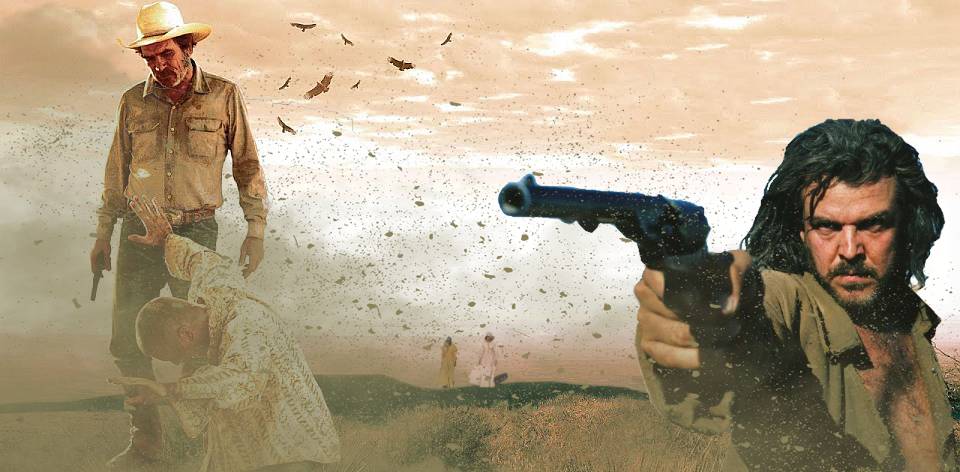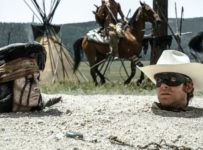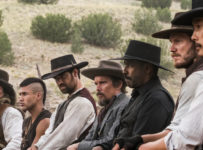The western is dead? Long live the western!
While it might be several decades since the glory days of the western, the last few years have seen numerous attempts at bringing back one of the true American cultural narratives. Long gong are the days of “cowboys and Indians,” replaced instead with stories that showcase marginalised voices, revisionist perspectives, and points of view from outside the US.
Here we’ve put together a list of our favourite westerns since 2000. Agree or disagree? Got your own favourites? Hit us up in the comments below.
Open Range (2003)
Despite its box office success and critical acclaim, this is one western than doesn’t get the respect it deserves. Based loosely on actor/director Kevin Costner’s love of the western romance novels of Lauran Paine, writer Craig Storper said he wanted to make a movie about “the evolution of violence in the West.” Joining forces with Robert Duvall, the sharply traditional western is the antithesis of late 1990s/early 2000s action films, but every bullet that lands has a lasting impact. It also marked the final on-screen appearance of Michael Jeter.
The Proposition (2005)
“Australia. What fresh hell is this?” On the other side of the world to the creation of the western, this bushranger tale redefines the meaning of the frontier. Called “pitiless and uncompromising” by Roger Ebert, the harsh violence of Australian-Canadian director John Hillcoat and writer Nick Cave’s film is underscored by Cave and Warren Ellis’ phenomenal soundtrack, one where the violin is a central figure in the storytelling.
The Three Burials of Melquiades Estrada (2005)
At the time of release, Guillermo Arriaga had solidified his reputation as a screenwriter with his so-called ‘Death Trilogy’ (Amores perros, 21 Grams, Babel). Yet it also marked star Tommy Lee Jones as a powerful director of the neo-western. Set in the modern day, it follows a straightforward narrative of Jones’ rancher Pete Perkins vowing to return the body of his titular friend to Mexico for a proper burial, but the telling is anything but average. Marco Beltrami’s score necessarily recalls Ennio Morricone, as this nonlinear narrative winds its way south in search of redemption.
The Assassination of Jesse James By the Coward Robert Ford (2007)
Potentially the winner of the longest title for a 21st century western, this beautiful film was from another outsider looking in. New Zealand-born Australian film director Andrew Dominik (Killing Them Softly). The beautiful Roger Deakins photography, coupled with another powerful score by Nick Cave and Warren Ellis, is a mesmerising slow waltz up to a death. On one hand it is the most traditional of westerns, pulling together stars Brad Pitt, Casey Affleck and Sam Rockwell in the same way golden age westerns attracted the stars of the day. It’s also a deconstruction of those myths, exposing the darker side behind every great story, simultaneously maintaining the ethereal and epic nature that’s inherent to them.
No Country for Old Men (2007)
Based on Cormac McCarthy’s magnificent novel, this modern saga is almost the funeral song for the traditional western sense of morality. The title (by way of William Butler Yeats) follows the thematic thread that the nature of “evil” has changed, with soon-to-be-retired sheriff Ed Tom Bell (Tommy Lee Jones again) lamenting that fact in the midst of increasingly violent crimes. Straddling the line between western and noir, and sharing McCarthy’s sense of nihilism, the Coen Brothers return to threads they explored in Blood Simple (1984) and Fargo (1996) in particular. It’s a masterpiece.
There Will be Blood (2007)
Speaking of masterpieces, Paul Thomas Anderson’s loose adaptation of Upton Sinclair’s novel Oil! is one that calls the western categorisation into question. Just like the inspiration Treasure of the Sierra Madre, it deals with what lurks in the hearts of humans in the pursuit of buried riches. It’s what Dana Stevens at Slate called “frontier capitalism.” In the words of guest columnist Chloe Cesta Jacobs, it’s “undeniably epic. That’s just all there is to it.” Full Review >>
The Good, the Bad and the Weird (2008)
When you think about Korean cinema, westerns are not necessarily the first things that come to mind. Then again, Kim Jee-woon isn’t your typical filmmaker. Drawing on both the American western and the so-called Spaghetti Westerns of Italian filmmakers, the film was labelled a “kimchi Western” by some. Totally embracing the ‘weird’ part of its title, the film sets its scene in 1930s Manchuria, with a plot that involves a train, a treasure map, and one hell of a chase.
Meek’s Cutoff (2010)
One of the first westerns of the century to truly examine the role of women in the mythos, it’s a mesmerising, ambitious observation of life on the prairie that makes you feel every step of the way. Being led across America, praire wife Emily Tetherow (Michelle Williams) doesn’t trust frontiersman Meek, and the conflicts begin to come to a head when they encounter a lone native (stuntman Rod Rondeaux) who agrees to lead them to water. Kelly Reichardt’s long takes and Chris Blauvelt’s skilled cinematography dictates the pace of the journey, giving us an experiential view of this epic voyage. Full Review >>
True Grit (2010)
“People do not give it credence that a young girl could leave home and go off in the wintertime to avenge her father’s blood, but it did happen.” While this might be a remake of the 1969 Henry Hathaway film with John Wayne, the Coen Brothers once again prove their mastery of this and any other genre. Bolstered by the key performances of Jeff Bridges and then newcomer Hailee Steinfeld, this is the Coens’ love-letter to the western. Full Review >>
Rango (2011)
The overall narrative might mirror Chinatown, but Gore Verbinski’s animated film has the beating heart of a western. Drawing on the traditions of over a century of westerns, coupled with the outstanding voice talents and gorgeous cinematic animation, allusions to other films and narratives make this an intertextual piece, but also a ridiculous amount of fun as well. Full Review >>
The Homesman (2014)
A powerful film about the marginalisation of women in the west. Tommy Lee Jones (yup, him again!) directs and co-stars, but lets himself become a prop in the traditionalist western set-up. The women of the film are pushed past the edge of madness, and are being transported back East by Jones’ Briggs and 31-year old “spinster” Cuddy (Hilary Swank). She too is a woman on the edge, and watching her teeter with all her might is a career-defining performance. The film’s nihilism gives us little hope, but as a spiritual successor to The Three Burials of Melquiades Estrada it solidifies Jones’ talent as a director while devastating us with the ambiguity of its ending.
Slow West (2015)
16 year-old Jay Cavendish (Kodi Smit-McPhee) makes his way across country to reunite with his love Rose. He encounters traveller Silas (Michael Fassbender), who agrees to protect the boy on his journey west. There’s a little of Cormac McCarthy about it, infused with Blood Meridian’s fatalism, and the suddenness of its violence. Director John Maclean has taken what would have otherwise been a straight bounty hunt and given it room to breathe. Full Review >>
The Revenant (2015)
Inspired by real frontiersman and fur trapper Hugh Glass (Leonardo DiCaprio), and more specifically the 2002 novel by Michael Punke, Captain Henry (Domhall Gleeson) leads a hunting party back from a trapping expedition, but is set upon by Native American Arikara Indians. If director Iñárritu’s Birdman showed a man unable to let go of his past, here is one that is unable give up on life due to raw revenge-filled emotion. Full Review >>
The Hateful Eight (2015)
Where Django Unchained troubled some critics (including filmmaker Spike Lee) for its blaxploitation/spaghetti western approach to slavery in America, Quentin Tarantino answers with a frank summation of racial tensions in America reframed within the context of a post-Civil War setting. As the title might imply, is a tense and angry film in its first act, and a powder-keg of tension just waiting to explode. Full Review >>
Hell or High Water (2016)
A beautifully shot character-based western that plays with the conventions of the genre in a smart mix of social commentary and slow-building tension. David Mackenzie and Taylor Sheridan’s film is slickly produced and cleverly woven together, and a much-needed skewering of the intricacies of modern life wrapped inside the deceptively simple morality tale of family and partnerships. Full Review >>




















First , never heard of some of these second a couple of them aren’t even westerns! I’m sorry but if the movie is set in the 21st century or in the 20th century after 1910 for that matter it’s not a western! With that said in my opinion you have 1 very good western on this list ( Open Range) and 1 pretty good remake ( True Grit ) but not as good as the original. The rest should have never been made although I love Kurt Russell in western roles The Hateful eight was no Tombstone!!!
Thanks for commenting. Hopefully you’ve found a few new discoveries to watch at some stage. I love the traditional western, and The Homesman, Meek’s Cutoff, Slow West, and Open Range definitely fall into that for me. I also think that there’s a frontier spirit inherent to the western that changed over the years, and it doesn’t matter when/where it’s set. Star Wars or Firefly are just as much of a western as any of these films following this line of thought.
We’ll have to agree to disagree! LOL